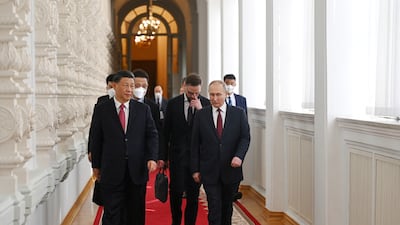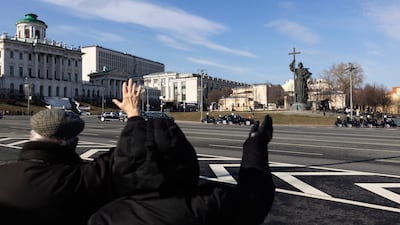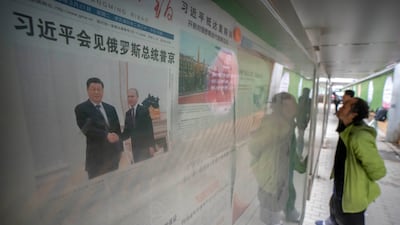Russia has embraced a new foreign policy strategy aimed at curtailing US and European “dominance” and apparently cementing a Cold War-style existence with the West.
President Vladimir Putin signed off on the updated strategy, which identifies China and India as key partners for the future, on Friday.
The US is “the source of fundamental risks to the security of the Russian Federation” and most European states are pursuing an “aggressive policy” aimed at undermining Russia’s sovereignty, according to the 42-page document.
Mr Putin issued the updated document as Russia’s military remains embroiled in Europe’s largest conflict since Second World War.
The policy “serves as a solid doctrinal basis for our further work on international affairs,” Mr Putin told a meeting of his Security Council.
Russia will seek to boost ties with “constructive partners” and create “conditions for unfriendly states to abandon their hostile policy toward our country,” he said
“The Russian Federation intends to give priority to the elimination of vestiges of the dominance of the United States and other unfriendly countries in world politics,” the strategy document states.
The term “unfriendly countries” is used by Russia to refer to those countries, particularly in Europe and North America, that have condemned Moscow's military campaign in Ukraine and adopted sanctions.
Russia faces an “existential” threat from the US and its allies, which are conducting “hybrid war” to weaken the country, Foreign Minister Sergey Lavrov told Mr Putin at the meeting.
“The United States of America is directly named as the main instigator and driver of anti-Russian sentiment,” he said.
“The West's policy of trying to weaken Russia in every possible way is characterised as a hybrid war of a new type”.
The new foreign-policy concept allows for “the use of the Armed Forces to repel or prevent an armed attack on Russia and its allies,” he said.
Russia aims to “create the conditions for any state to reject neocolonialist and hegemonic aims”, the document says.
Moscow has sought to boost political and economic ties with countries in Africa and Asia that took a more neutral stance towards its offensive in Ukraine.
In the new strategy, Russia singled out ties with China and India and stressed the importance of “the deepening of ties and co-ordination with friendly sovereign global centres of power and development located on the Eurasian continent”.
Chinese President Xi Jinping visited Russia earlier this month and Moscow has stepped up energy supplies to both China and India.
The document describes Russia as a “state-civilisation” tasked with defending what it called the “Russian world” of related cultures on the Eurasian continent.
The concept of a Russian world has been used by the Kremlin to justify its actions in Ukraine with claims that it is defending the country's Russian-speaking minority.















